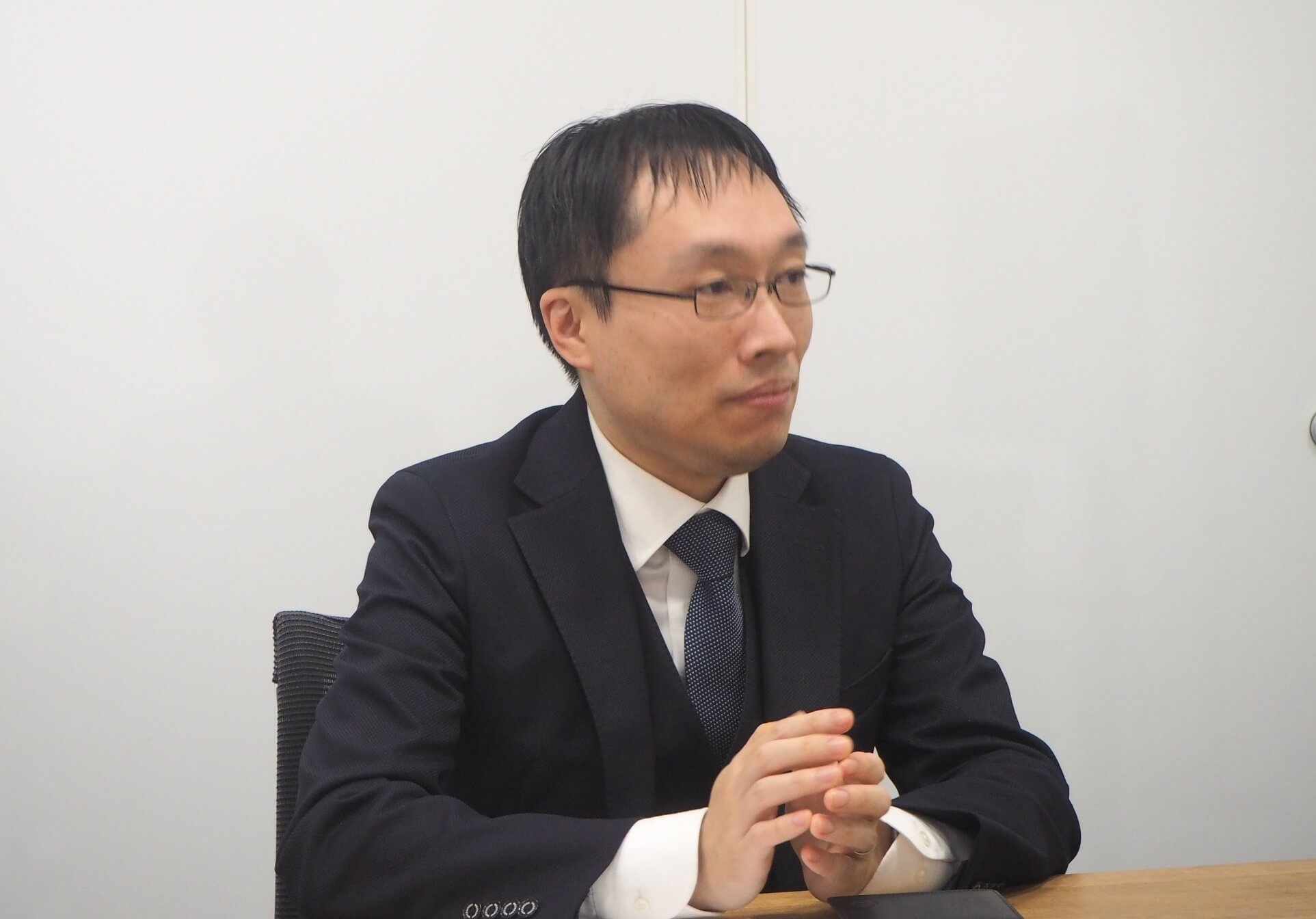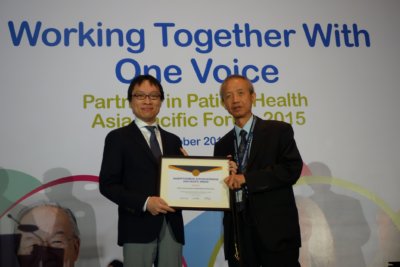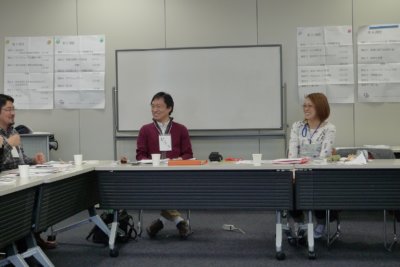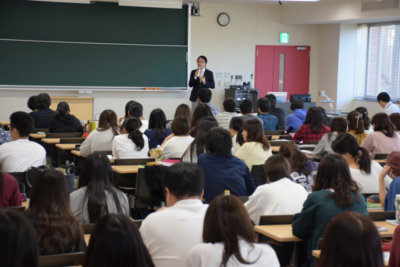Interviews
- Home >
- interviews >
- Supporting the Activities of People Living with NCDs to Build an NCD-Friendly Society

-
2020.02.07
Supporting the Activities of People Living with NCDs to Build an NCD-Friendly Society
Mr. Hiroki TakedaChief Knowledge Officer, PPeCC (Power to the People with Chronic Conditions)
Executive Director, Japan Chronic Disease Self-Management Association
-
Story Behind Our Current Activities
The peace of mind knowing there is an organization representing people with NCDs
I was born with hemophilia and was infected with HIV during the HIV-tainted blood crisis. I also have other diseases, including a disease of the heart. During my university days, when my health was particularly poor, I received counselling from a support group for people infected with HIV-tainted blood called the Habataki Welfare Project. Their counselling made me realize that it gives one a sense of gratitude and peace of mind to know there is an organization representing people living with NCDs that they can consult on healthcare and welfare-related problems.
I was frequently hospitalized around the time I graduated from university, so I gave up on finding employment. After graduation, I worked as a freelance writer for a friend who had graduated before me and had started working at a publishing company. One day, the Habataki Welfare Project invited me to a self-management training program for chronic diseases. The program was developed by Stanford University and it aims to help people living with NCDs systematically learn self-management skills to improve their Quality of Life (QOL).
At the time, various organizations representing people living with NCDs including the Habataki Welfare Project wanted to introduce the program in Japan to enable people living with NCDs to aim to engage in new, independent activities. They also had the support of the Japan Pharmaceutical Manufacturers Association Public Relations Committee Patient Group Subcommittee. I participated in a training seminar held as part of its introductory project and was offered a position as an establishing member of the Japan Chronic Disease Self-Management Association (J-CDSMA). J-CDSMA was established to spread the program throughout Japan. I was put in charge of its administrative staff.
Self-management for Achieving One’s Aspirations
In the past, the most common methods of disease self-management used in Japan were related to treatment through things like medicine, diet, and exercise. However, our program teaches self-management across three domains: treatment, lifestyle, and emotional state. For example, it covers communication strategies – how to ask coworkers for help so that one can continue working without straining one’s health, or how to communicate with one’s doctor to be able to cooperate more effectively when considering treatment options. The program not only addresses health; it covers every aspect of everyday life for those most affected by NCDs.
When participating in the program, I was asked, “Self-management is for becoming able to do what you want to do, so what is it that you want to do?” I did not have an answer. Conversely, I could only think of the many things I have to do, like getting injections or taking medicine. This made me realize that we live to accomplish our aspirations and that we do not have time to let unavoidable things prevent us from doing so. Improving my health through self-management and vowing to think of at least one more thing I wanted to accomplish was the start of my current activities for people living with NCDs.
During my time establishing J-CDSMA and participating in its activities, I met other people who shared my feelings. Together, we established PPeCC. PPeCC is engaged in providing support for people with NCDs and organizations representing them and works to build public awareness towards NCDs.

-
Current Activities
There are limits to individual effort
During J-CDSMA activities, there are two things I found difficult. The first is that it is financially difficult to sustain the operations of an NPO. Japan has no donation culture. This makes it difficult for civil society organizations to sustain activities while operating on a certain scale. Most support is provided on an annual basis, so there is no guarantee that financial resources available one year will still be there the next.
The second thing is that there is a limit to what can be achieved through the individual efforts of people living with NCDs. I discovered this difficulty when trying to expand the self-management training program for chronic diseases. If a person has a disease, there are days when it will make them unwell. Just being part of society can be hard. For example, while various individual efforts are important – efforts such as acquiring the skills needed to get a job or to effective use self-management to maintain good health – I do not believe that these efforts alone will make it an easier world for people living with NCDs to live in. I want to make the world an easier place for people living with NCDs to live. I want to support civil society organizations that are struggling to exist. These feelings partially led to the establishment of PPeCC.
-
Good Practices for Patient Empowerment
Transitioning from Someone Receiving Healthcare to Becoming a Messenger to Others
When you have a disease, you tend not to meet any role models. I, too, had no idea how to live my life with my sick body when I was in high school. However, I was able to meet a great number of people who set an example for me by participating in activities at organizations representing people living with NCDs.
In my past activities as a person living with an NCD in the fields of serious disease and cancer, speaking to the people who came before me gave me many ideas about how to open pathways for creating an NCD-friendly society. Meeting like-minded people motivates me.
Sometimes the people who complete the training program on chronic disease self-management go on to become trainers in the program themselves. Some of the people who come to us for consultation become consultants, so it is not a one-way relationship. It is a cycle. I think that is one of the good points about our activities.
Earnest Efforts from the Government Can Have Major Effects on the Environment
After the victims of the HIV-tainted blood scandal won settlements from the government and pharmaceutical companies, the AIDS Clinical Center (ACC) was established as part of the National Center for Global Health and Medicine in 1997. In addition, eight regional core hospitals were established, creating a framework in Japan for providing treatment to people with HIV.
Until that healthcare framework was established, about sixty victims lost their lives annually. After the ACC and the eight regional core hospitals were established, the number of annual victims fell dramatically, to around ten to twenty people. The number of HIV-related deaths has decreased even more in recent years because pharmaceuticals to effectively treat HIV have been developed. The system for treating HIV in Japan was built in response to the government’s recognition of the parties affected by the scandal, who emphasized that the creation of specialized medical services saves lives. This made me realize that an earnest response from the government can significantly change the care environment. It also taught me the importance of incorporating the stories and opinions of those most affected into healthcare policy. What is most important is to have the enthusiasm to continue without ever giving up and to show objective data that will convince others.

-
What Qualities Make a Good Leader?
Balancing being uncertain with being decisive
Being a representative of people living with NCDs is a great responsibility and a significant undertaking. That is why it I think it is necessary to always balance uncertainty and decisiveness. Promoting one policy may have a harmful influence elsewhere. We must not only focus on benefits; we must also remember that there may be risks.
I believe there are many times when the policy-makers representing people living with NCDs must be decisive as to what they want to accomplish first, even when they feel confused and lost. If doing so causes harm elsewhere, then they must think of a response immediately. These matters are by no means ended when a decision is made. There are many determined people who relentlessly pursue better versions of past solutions. When a decision has been reached, they do not stop thinking about it or stop feeling lost. Rather, they pursue new solutions.
How many faces of those most affected can you picture in your mind’s eye?
They key to being decisive when one is lost is to remember as many of the people most affected as possible. After all, any single person’s experience is too narrow and everyone has unique experiences. I think it is important to think of as many of the people most affected as possible when making a proposal.
When the revised Cancer Control Act was enacted on December 9, 2016, the opinions of organizations representing people with cancer was one of the driving forces behind the inclusion of new items promoting research on refractory cancers and rare cancers. Those who gathered the requests and proposals of those most affected must have listened patiently and closely to a mountain of stories and opinions. This enabled them to produce the greatest number of solutions by acting decisively even when they felt uncertainty. I think it becomes a question of how many stories and opinions we can listen to through our everyday activities. For example, PPeCC operates cafes where various people can speak easily.
In recent years, medications to treat HIV have been developed and fewer people are dying as a result. However, during the period when I was often hospitalized, when it came time to see off the people I met and became close friends with in the hospital, there was usually no choice but to do it in the morgue. I also lost my uncle to HIV that was the result of the tainted-blood scandal, so I experienced the realities of life and death often during my high school and university days. These were formative experiences that I will never forget.
When I picture the faces of various people both living and passed away, I feel that I must further improve the environment for people living with NCDs. To accomplish this, I must be decisive. I must build channels that will enable me to learn of troubles and trials facing people living with NCDs that I did not know about before. This belief is central to my activities. Doing so can also add meaning to activities conducted by platforms like NCD Alliance Japan and PPeCC that help various people share the wisdom they possess and the issues they face.

-
Future Activities
Continue to cooperate with various people and help each other
I think the first step of being able to continue activities over a long period is to self-manage one’s health to stay healthy. I currently belong to three organizations. There are good sides to both individual efforts made in groups representing people living with NCDs and group efforts involving various people, so I would like to continue appreciating both types of activity.
To expand activities, efforts to gather a variety of people are important. It is difficult for people to work exclusively on activities for organizations representing people living with NCDs. Many of the people involved in those organizations have other jobs, but the burden can be split if each organization improves efficiency for group efforts. Because it is already physically challenging for people living with NCDs to participate, I think continuing to help one another is best.
Create opportunities for young people to feel significant
Nowadays, anyone can obtain vast amounts of information with an internet search. We will set aside the question of whether or not all of that information is reliable. This easy access to information has made it more difficult to get young people involved in organizations representing people living with NCDs. However, I think we must continue activities that attract the participation of young people.
I think one method to accomplish that is through the effective use of Information and Communications Technology (ICT). Some organizations use internet meeting systems to hold exchange meetings. This allows people to participate without having to go to the venue. In the future, I want to increase opportunities that allow young people to feel the significance of their participation.
For example, finding a job is one major issue directly facing young people. In Japan, which emphasizes hiring fresh graduates directly out of university, it is difficult to go back and restart if you diverge from a career path along the way. If employment practices do not become more flexible, it will be more difficult for people living with NCDs to lead stable everyday lives while managing their health. Businesses, meanwhile, have to face the problem of a shrinking labor force. If they continue to refuse to hire anyone who cannot energetically work a full-time position, it will likely grow more difficult for them to secure talented human resources.
In other words, improving working conditions and flexibility is a win-win for both parties. I want us to make progress on both fronts because creating opportunities for various people to actively contribute is beneficial to society. In November 2019, PPeCC held a workshop entitled “Support for Balancing Serious Diseases and Employment – A Cooperative Workshop for People Living with NCDs and Their Supporters.” There, we had an extremely meaningful opinion exchange session that included specialists like certified social insurance and labor consultants. I want to hold more events like it in the future.
Recently, our young members who are fluent in English have had more opportunities to travel abroad for training programs. However, we are still hindered by the language barrier and Japanese people living with NCDs cannot easily participate in such events. I would like for more English speakers to join us in the future.
Compared to other countries, one of Japan’s best systems is the National Health Insurance (NHI) system. While it has been forecast that the fiscal challenges facing NHI will grow in the future, we must do our best to maintain it. Japan also has many people who actively contribute to organizations for people living with NCDs as unpaid volunteers, who are driven only by their passion. This is another strength of Japan that other countries may lack. However, in the future, we must support those people so that they can continue their activities without overexerting their resources. I would like for PPeCC to promote that support moving forward.


